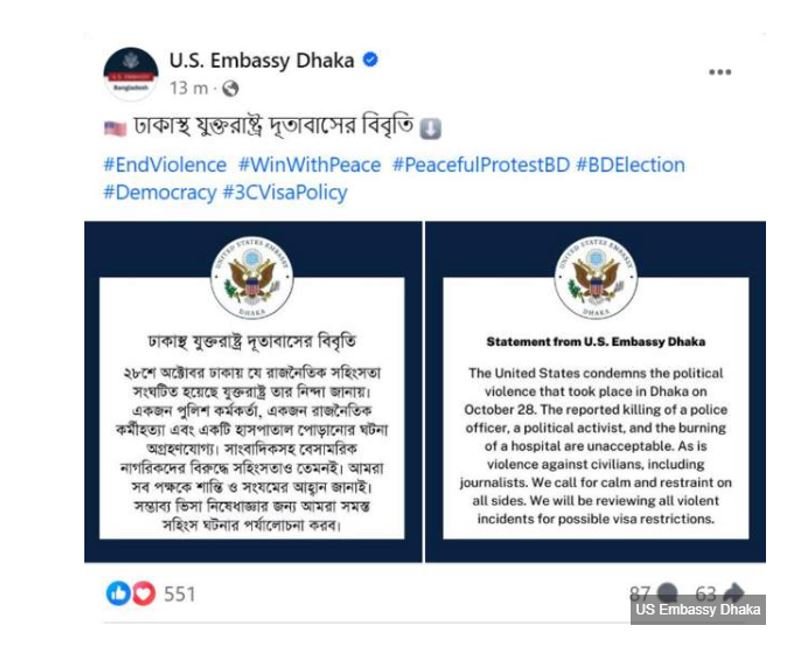The EU’s unique approach and emphasis on cooperation reveal the intricate web of diplomatic relationships and economic interests shaping global perspectives on Bangladesh. The EU emphasizes cooperation with Bangladesh until 2032 to address labor rights issues in the EU market
The United States is facing challenges in garnering support from Western allies on issues concerning Bangladesh. Disagreements emerged among Western countries, including the U.S., regarding the language of a joint statement following clashes around a BNP rally on October 28. While a joint statement was eventually issued by seven nations, including the U.S., the U.S. Embassy in Dhaka condemned the incident separately, hinting at potential visa bans. Whereas in the joint statement EU seven nations, including the U.S., advocated for creating a conducive electoral environment in Bangladesh.
You Can Also Read: Is hope growing higher on voter turnout in Bangladesh elections?
In the Labor rights approach to Bangladesh, the U.S. linked it to their national security and threatened sanctions. The EU takes a distinct stance, affirming ongoing progress in labor rights implementation in Bangladesh and maintaining a cooperative relationship until 2032.
“The United States will work to empower workers, establish their rights, and improve working conditions in every country. It is one of the keys to ensuring US national security and foreign policy. Establishing workers’ rights is not just an internal matter. We want to ensure this in the international context. Therefore, it is one of the keys to the national security and foreign policy of the United States.”
–Anthony Blinken, The US Secretary of State
However, the scenario of political unrest and violence by the BNP party, especially in the aftermath of the BNP rally, further complicates the situation. The U.S. Embassy’s condemnation and the threat of visa bans underscore the gravity of the situation, while global perspectives from India, Russia, and China diverge from the U.S. stance, branding the election as Bangladesh’s internal affair.
Scenario of BNP’s Anarchy
Since the confrontations related to the BNP rally in Dhaka commenced on October 28, 2023, until yesterday, Wednesday (December 6, 2023), the fire service has received reports of 250 vehicles and 15 structures being set on fire across the country. Among these incidents, 155 involve buses.
This information was disclosed by the fire service in a press release issued yesterday, Wednesday (December 6, 2023). Alongside providing statistics for over a month, the agency also conveyed that from 6 am on Tuesday to 6 am on Wednesday, three vehicles were set ablaze.
The burnt vehicles include;

According to the fire service, the burnt vehicles include 155 buses, 43 trucks, 21 covered vans, 8 motorcycles, and 23 others such as ambulances and trains.
BNP has opposed the schedule for the 12th parliamentary elections, calling for elections under a non-partisan government. They have been organizing programs like hartal-blockades intermittently. Incidents of arson and vandalism are occurring regularly nationwide, including in Dhaka, during these protest movements.
Before the 12th National Election, the BNP had announced a rally in Nayapaltan on October 28. On the same day, Jamaat-e-Islami announced a rally in Motijheel, and Jamaat held a rally in Arambagh. During BNP’s rally in Paltan, clashes erupted in Kakrail and nearby areas. Following confrontations between BNP activists and the police, incidents of arson and vandalism occurred in various locations that day. The BNP, which has been out of power for the past three terms, resumed its old strategy of strike blockades starting from October 29, the day after the rally.
US Embassy’s Condemnation and Visa Ban Threat
The US Embassy in Dhaka issued a statement condemning the political violence on October 28 in Dhaka and hinted at potential visa bans pending a review of facts. They also call for a free and fair election through dialogue.
“The killing of a police officer, the burning of a hospital in political violence are unacceptable,” the statement said.

It also mentions violence against civilians including journalists. The United States takes a tough stance on labor rights, linking them to national security. The American Federation of Labor and Congress of Industrial Organizations (AFL-CIO) actively engages in global labor rights issues, prompting warnings from the US Secretary of State to Bangladesh.
Global Perspectives About Bangladesh
Surprisingly, India typically a US ally, Russia, and China, asserted that the election is Bangladesh’s internal affair, diverging from the US perspective. They also accused the United States of interference.
France, Germany, the United Kingdom, Canada, Italy, Norway, Netherlands, Switzerland, and Japan each have unique visions, strategic goals, and priorities regarding Bangladesh. Despite alignment on various global issues, the United States finds itself different on the Bangladesh election and labor rights matter. Anticipation of sanctions against the Rapid Action Battalion (RAB) following the US’s move in 2021 did not materialize among Western countries, revealing a complex web of diplomatic relationships. Economic interests, such as the Airbus agreement with France, influence the stance of certain Western nations, highlighting the multifaceted nature of international relations. In this context, The EU takes a distinct approach to labor rights, with ongoing progress noted during the EU GSP review team’s recent visit.
Charles Whiteley, the EU ambassador, emphasizes cooperation with Bangladesh until 2032 to address labor rights issues in the EU market. The EU maintains an independent expert team in Bangladesh to assess electoral issues.
Conclusion
The complex dynamics surrounding Bangladesh’s internal affairs, particularly the recent political violence and clashes, have exposed divergent views among Western allies. While the U.S. underscores the importance of labor rights for national security, its stance differs from Russia, China, and even India. The EU’s unique approach and emphasis on cooperation reveal the intricate web of diplomatic relationships and economic interests shaping global perspectives on Bangladesh. The challenges faced by the U.S. in garnering unified support underscore the multifaceted nature of international relations in the context of Bangladesh’s elections and labor.


